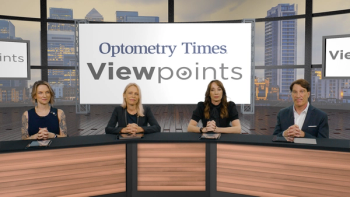
AAOpt 2022: Genetic testing in AMD
Brad Sutton, OD, FAAO, FORS, discusses key takeaways from his discussion, "Genetic testing in AMD: critical, useful, or inappropriate," which he presented during the 2022 American Academy of Optometry meeting.
Brad Sutton, OD, FAAO, FORS, clinical professor at Indiana University School of Optometry, and service chief of the Indianapolis Eye Care Center, speaks with Optometry Times®' Kassi Jackson on highlights from his discussion titled, "Genetic testing in AMD: critical, useful, or inappropriate," which he presented during the 2022 American Academy of Optometry (AAOpt) annual meeting in San Diego.
Editor's note: This transcript has been edited for clarity.
Jackson:
Hi, everyone. I'm Kassi Jackson with Optometry Times. And I'm joined today by Dr. Brad Sutton, clinical professor at Indiana University School of Optometry and service chief of the Indianapolis Eye Care Center.
He's here to share highlights from his discussion titled, "Genetic testing in AMD: critical, useful, or inappropriate," which he is presenting during the 2022 American Academy of Optometry meeting held this year in San Diego. Thank you for being here, Dr. Sutton.
Sutton:
Thanks, Kassi, I appreciate you having me.
Genetic testing in AMD is a very controversial topic. It's something we've embraced in our clinic for several years now, and I feel pretty strongly that it has a role in good high-level AMD care.
Really, when you talk about genetic testing with AMD, there's a couple of things that the available genetic tests, or at least some of them, can tell us about our AMD patients and give us a risk profile for how likely they are to advance to geographic or wet advanced disease over a course of a number of years. And it can also tell us—if you believe the background on this information—it can tell us whether zinc would be likely to be helpful or harmful to that patient and supplementation form. And that's really where the controversy comes in.
So this particular talk, I go over that controversy and talk about the articles that have played into that controversy and what we know and what we don't know, and so for people who are interested in maybe doing genetic testing on our AMD patients, I think the talk will be a good resource for them to kind of learn a little bit about the topic and how they can offer it for the patient.
Jackson:
Why is this so important for optometrists to discuss?
Sutton:
Yeah, I mean, AMD is obviously growing more prevalent all the time, right? The population is aging, so we see lots of patients with AMD, a lot of those patients are going to have intermediate AMD, which is at risk for progressing to advanced disease. And if there's anything that we can do to provide better care for them, you know, maybe not give them supplements that are going to hurt them, maybe watch them more closely if they're in high risk, it's only going to help our patients have better outcomes.
Jackson:
So what does this mean for patient care?
Sutton:
It basically means that, you know, if we know this information, we can tailor a treatment approach for them instead of treating everyone the same. And I think that's very important to a lot of other disease processes. We realize in medicine now that genetics play a big role, and so it's very reasonable to assume that in macular degeneration, that might be the case as well.
Newsletter
Want more insights like this? Subscribe to Optometry Times and get clinical pearls and practice tips delivered straight to your inbox.





































